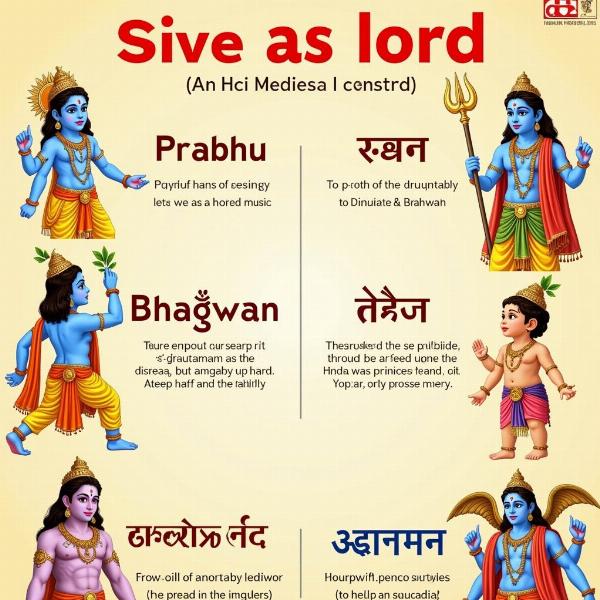Understanding the meaning of “lord” in Hindi requires delving into the rich tapestry of Indian culture and spirituality. The word “lord” in English carries connotations of power, authority, and ownership. In Hindi, several words capture these nuances, each reflecting different aspects of lordship, from the divine to the secular. This exploration will uncover the various Hindi translations of “lord” and their cultural significance.
Exploring the Divine: Hindi Words for “Lord” in Religious Contexts
In Hinduism, the concept of lordship is deeply intertwined with devotion and reverence towards deities. Numerous words express this divine lordship, each imbued with unique meaning and used in specific contexts. “Prabhu” (प्रभु) is a common term for lord, denoting mastery and sovereignty. It is often used to address deities like Krishna and Rama, signifying their supreme power and control over the universe. Another prominent term is “Ishwar” (ईश्वर), which refers to the supreme God, the ultimate controller of all creation. “Bhagwan” (भगवान) is another revered term, often used synonymously with Ishwar, but also applied to highly respected individuals or avatars of God.
 Meaning of Lord in Hindi: Religious Context
Meaning of Lord in Hindi: Religious Context
Beyond the Divine: Secular Meanings of “Lord” in Hindi
While the religious connotations of “lord” are prominent, the word also has secular applications in Hindi. “Swami” (स्वामी) can mean “lord” in the sense of owner or master, often used to refer to the head of a household or the owner of a property. “Malik” (मालिक) carries a similar meaning, denoting ownership and control. It can be used for both inanimate objects and people, such as the “malik” of a shop or a house. “Adhipati” (अधिपति) is a more formal term for lord, signifying ruler or sovereign, often used in historical or political contexts.
Delving Deeper: Understanding Nuances and Cultural Context
The precise meaning of “lord” in Hindi often depends on the specific context and the relationship between the individuals involved. For example, “prabhu” can be used respectfully to address an elder or someone in a position of authority, even outside of religious contexts. Similarly, “swami” can be used as a term of endearment between spouses. These nuances add depth and complexity to the understanding of “lord” in Hindi.
Lord in Common Phrases and Idioms
Several Hindi phrases and idioms incorporate the various words for “lord.” Understanding these expressions provides further insight into the cultural significance of lordship. For instance, “Prabhu ki kripa” (प्रभु की कृपा) translates to “by the grace of the Lord” and expresses gratitude for divine blessings. “Malik ki marzi” (मालिक की मर्ज़ी) means “the owner’s will” and signifies acceptance of fate or destiny. jagannath meaning in hindi and keshu meaning in hindi offer further exploration into specific divine names.
How Do You Say “Lord of the Rings” in Hindi?
A popular example demonstrating the translation of “lord” in a specific context is the title “Lord of the Rings.” In Hindi, it is translated as “Angoothion ka Malik” (अंगूठियों का मालिक), literally meaning “Owner of the Rings.” This translation emphasizes the concept of ownership and control, reflecting the power wielded by the ring’s possessor. rabbul alamin meaning in hindi provides another example of a title related to lordship.
Conclusion: A Multifaceted Concept
The meaning of “lord” in Hindi is not monolithic. It encompasses a spectrum of meanings, reflecting the diverse cultural and religious landscape of India. From divine appellations to secular designations, the various Hindi words for “lord” offer a glimpse into the intricate web of relationships, beliefs, and power dynamics that shape Indian society. Understanding these nuances is crucial for anyone seeking a deeper understanding of Hindi language and culture. Exploring further, you might find janardhan meaning in hindi and warlord meaning in hindi helpful for a more comprehensive view.
FAQ
- What is the most common Hindi word for “lord” in a religious context? Prabhu and Bhagwan are among the most commonly used terms.
- What is the difference between “Ishwar” and “Bhagwan”? While often used synonymously, Ishwar emphasizes the supreme God’s absolute power, while Bhagwan can also refer to avatars or highly respected individuals.
- Can “swami” be used for women? While traditionally used for men, “swami” can be used for women in certain contexts, especially in spiritual traditions.
- Is “malik” always used in a positive sense? While generally neutral, “malik” can sometimes carry negative connotations, depending on the context.
- What are some other Hindi words related to “lord”? Other related words include “adhipati” (ruler), “nath” (master), and “sarkar” (government).
Meaning-Hindi.in is your trusted partner for accurate and culturally sensitive Hindi translation services. We specialize in various domains, from business and legal documents to technical manuals and website localization. Our team of expert linguists ensures that your message is conveyed effectively and respectfully in the Hindi language. Contact us today for all your Hindi translation needs at [email protected] or +91 11-4502-7584. Meaning-Hindi.in offers a wide range of services, including document translation, interpretation, and localization, catering to diverse industries and individual needs.